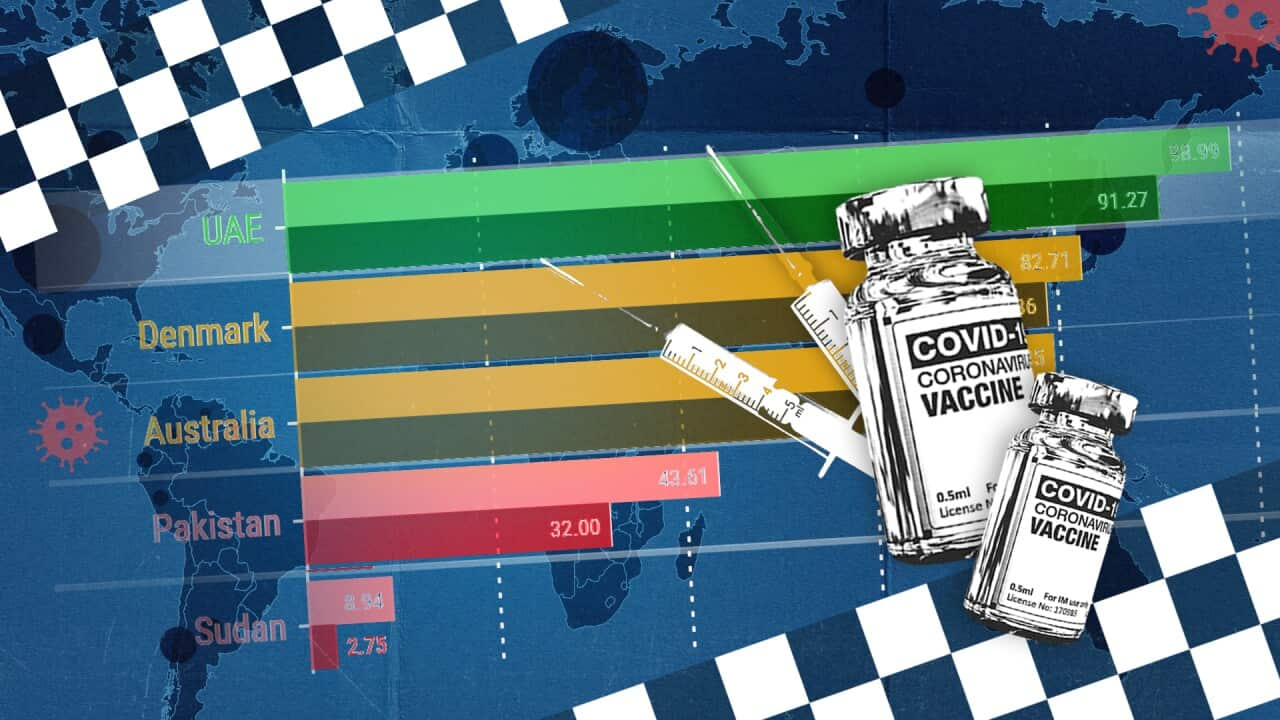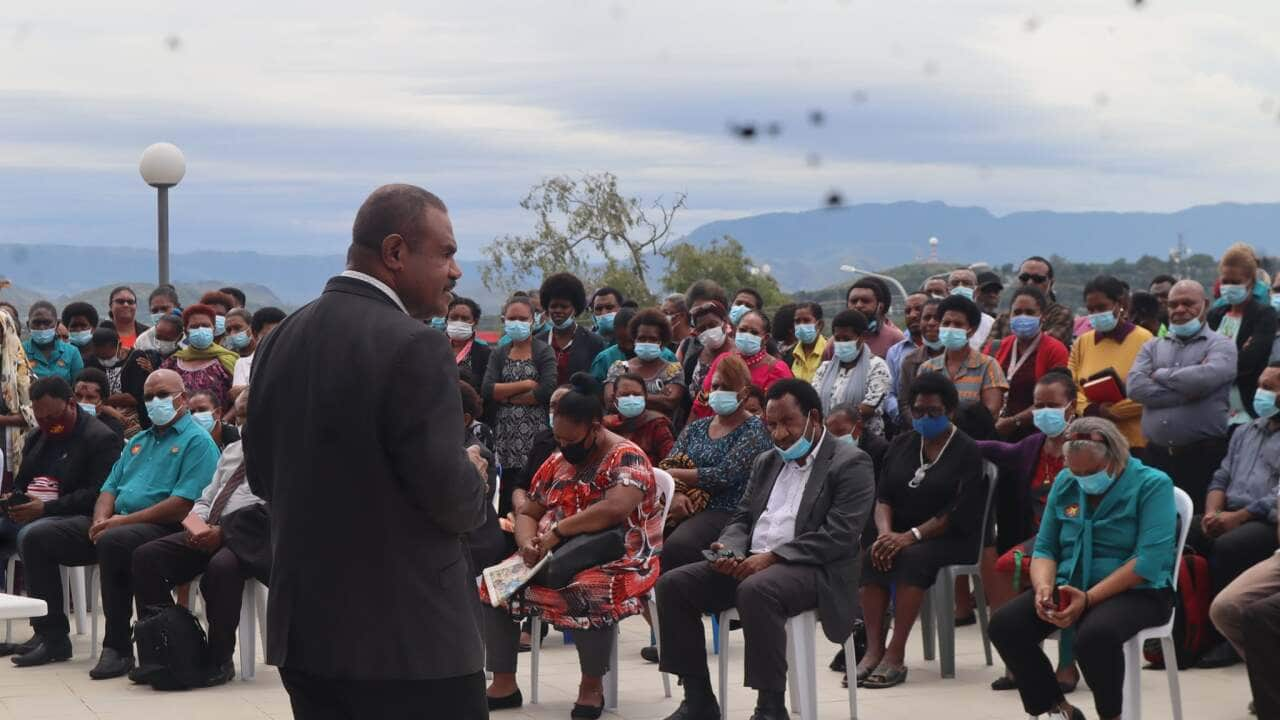Australia will send 8,000 AstraZeneca jabs to Papua New Guinea to vaccinate its frontline healthcare workers, as the country battles a growing COVID-19 crisis.
The vaccinations will begin in the capital, Port Moresby, before being rolled out to other provincial capitals.
Prime Minister Scott Morrison confirmed the rollout during a Wednesday press conference from Canberra.
“Throughout the course of the COVID-19 pandemic, we have always been extremely concerned for our Pacific family, for our neighbours,” Mr Morrison said.
“Over the course of this last year, the Pacific community has done such an extraordinary job to substantively keep their islands free of COVID-19, but we've known that that challenge was always going to be too great for Papua New Guinea as time went on.”
The government also announced it would gift essential personal protective equipment (PPE) to PNG, including one million surgical masks, 100,000 bottles of sanitiser and 20,000 face shields.
Passenger caps will be reduced by one-quarter from flights from Port Moresby to Brisbane, effective from midnight tonight.
“We are also making a formal request to AstraZeneca and the European authorities to access one million doses of our contracted suppliers of AstraZeneca, not for Australia, but for PNG, a developing country in desperate need of these vaccines,” Mr Morrison added.
Foreign Affairs Minister Marise Payne said the vaccines were expected to arrive in PNG next month.
"The 8 ,000 doses of vaccines that we have referred to this morning will fill a critical gap in advance of Papua New Guinea’s receipt of its vaccines from the COVAX facility," she said.
"They are expected in Papua New Guinea in April and then further doses in May, so this gap for front-line workers will be absolutely essential for those people to be able to continue to do the job that they are doing."
Chief Medical Officer Professor Paul Kelly said the situation in PNG has "changed very rapidly" over the last two weeks.
"Of the cases diagnosed in PNG, half of them have been diagnosed in the past couple of weeks, from the beginning of the pandemic," he said.
"Recognising that they did not have the resources for mass testing like we have in Australia, so any number you see out of PNG of cases and even deaths will be a major underestimate.
"There is a big outbreak of COVID-19 in PNG. We know this from the places that are able to be doing testing.
"They’ve done mass test entering and almost half the samples are positive.
"They’re finding the same when people are being admitted into hospitals in Port Moresby. Half of women who are coming in due to pregnancy are positive.
"We’re seeing a large number of health care workers on the front lines in Papua New Guinea now coming down with COVID-19. These are all signs that there is a major epidemic in the community."
Labor Senate leader Penny Wong criticised the Morrison government's response to the crisis as long overdue, saying the situation in PNG had been unfolding for some time and the Prime Minister “should have acted earlier”.
“It has been uncertain, it has been tardy, and I would urge the government to act promptly and swiftly to provide PNG with the support, with the vaccines, with the personal protective equipment that are required," Ms Wong said.
PNG is identifying about 100 new cases a day and has recorded 2269 cases since March 9. There have 26 confirmed deaths, according to the World Health Organisation.
But testing rates are low, particularly in remote areas, raising serious concerns the virus could be spreading unchecked.
More than half of the active coronavirus cases in Queensland have originated from its northern neighbour, and the state is currently rolling out a prioritised vaccination program in the Torres Strait.
Premier Annastacia Palaszczuk has spoken with Mr Morrison about the risk the spread of the virus in PNG poses to her state.
"The Commonwealth government has been very good in this space, they've often reached out at times of need of our Pacific Island neighbours,' she said on Tuesday.
Most of the positive test results in PNG are amongst the general population.
But about 40 per cent of samples from workers, including FIFO workers, at PNG's Ok Tedi mine have also come back positive.
Health Minister Greg Hunt told a joint party room meeting in Canberra on Tuesday the situation was a "clear and present danger".
Foreign Minister Marise Payne said the government will deploy a three-person AUSMAT team to PNG.
Australia will also help to reopen PNG health facilities including testing centres.
"We understand the system is very strained," she said.
Mr Morrison on Tuesday spoke to his PNG counterpart James Marape about the developing situation.
Ms Palaszczuk said extra support for PNG hospitals and vaccinations for healthcare workers was a priority.
The closest islands in the Torres Strait are a short dingy ride to PNG, and leaders in the region say an outbreak would be devastating.
"We're very remote, very vulnerable," Torres Strait Island Regional Council mayor Phillemon Mosby said.
Meanwhile six refugees formerly detained on Manus Island have tested positive for COVID-19 in Papua New Guinea in recent days, intensifying calls for them to be brought to Australia.
PNG is suffering a worsening outbreak of the virus, which Australia's Health Minister Greg Hunt said on Tuesday poses a "clear and present danger" to both nations.
Half of the 500 tests conducted by Queensland facilities for PNG on Monday came back positive.
More than half of the state's active cases have been linked to PNG.
Some 130 refugees and asylum seekers sent by Australia to Manus Island in 2013 and 2014 remain in PNG, with all but two now in Port Moresby.
The six positive cases are isolating in a hotel and other accommodation
One of the refugees, who didn't want to be named, told AAP he tested positive last Tuesday after attending hospital with stomach pains.
Doctors told him he has pneumonia in his chest.
He said he is receiving daily visits from medical staff, but that the Pacific International Hotel did not follow infection protocols in its emergency room and did not properly isolate COVID-positive patients.
Foreign Minister Marise Payne told reporters in Canberra on Tuesday the government had arranged the deployment of an AUSMAT team to PNG.
It will also help to reopen PNG health facilities including testing centres.
"We understand the system is very strained," she said.
Prime Minister Scott Morrison spoke to his PNG counterpart James Marape about the developing situation on Tuesday.
Queensland is rolling out priority vaccinations in the Torres Strait, which is just four kilometres from PNG.
Queensland Premier Annastacia Palaszczuk said on Tuesday the Commonwealth government had "often reached out at times of need" to Pacific neighbours.
"I don't think that they will ignore this situation," she said.
Advocates say the Australian government has a special duty to the refugees it sent to PNG, and that they should be brought to Australia.
"The government has already damaged their mental and physical health. Now, the government is exposing them to even greater and unnecessary risk," the Refugee Action Coalition's Ian Rintoul said.
"They should be urgently evacuated to Australia."
Dr Barri Phatarfod from Doctors 4 Refugees told AAP "the Australian government really needs to take responsibility for these individuals".
"They're clearly under Australia's care," she said.
"The medical care is paid for by Australia, and PNG just simply can't cope at the moment."
She added that the refugees are particularly vulnerable to infection.
"For the last eight years, their immune system has been slowly depleted, medical conditions that have been noted several years ago have remained largely untreated or inadequately untreated."
The unnamed refugee said former detainees feared being identified as COVID patients as they will be further shunned by locals.
"Unfortunately...their mindset is going to be that the refugee brought the COVID...they blame us," he said.
He arrived in PNG in August 2013. He was interviewed for resettlement in the US in February 2019 but is still awaiting an outcome.
Under Australian government policy, he cannot be settled in Australia because he sought asylum by boat.




